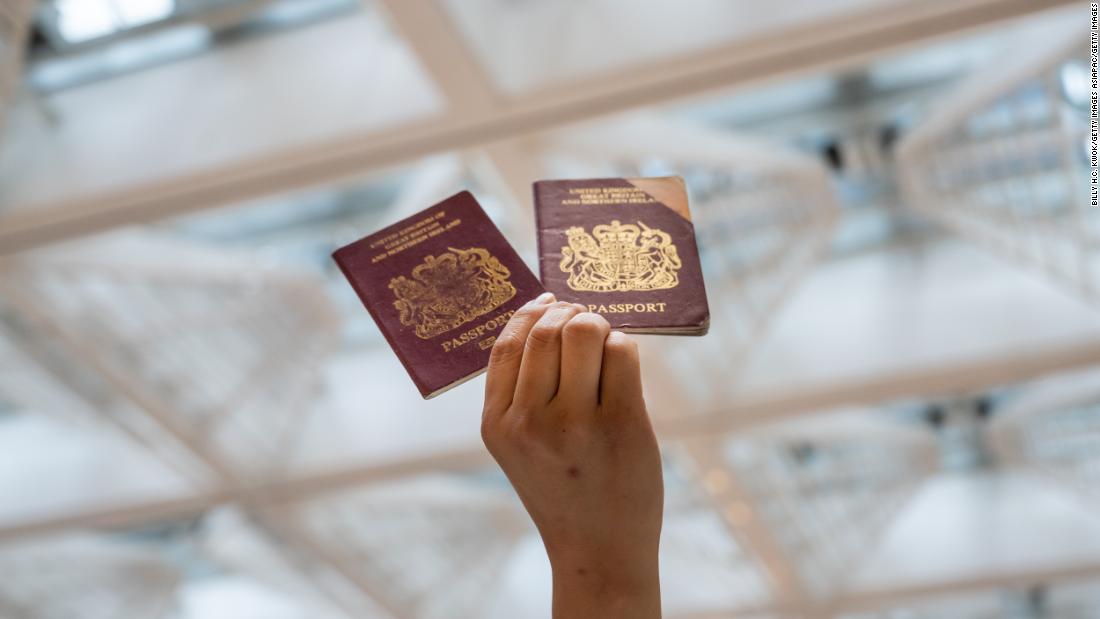Last year, China imposed a comprehensive national security law in Hong Kong that, critics said, withdrew its autonomy and precious civil and social freedoms from the city, while consolidating Beijing’s authoritarian rule over the territory. Since then, many prominent activists and politicians have fled, while others have quietly begun to move abroad.
The law criminalizes secession, subversion and collusion with foreign forces, and carries a maximum sentence of life in prison.
According to data from the UK Home Office, acquired by CNN through a request for freedom of information, since July 2019, when anti-government protests broke out across the city, more than 400,000 BN (O) passports were issued to Hong Kong residents. Kong, more than the total number issued in the previous 15 years.
By the time the national security law was proposed, the number of passports issued jumped from 7,515 in June 2020 to more than 24,000 in July. These numbers may also be less than the number of people applying, as the coronavirus pandemic appears to have impacted passport processing last summer.
China reacted angrily to the proposed plan, claiming that it breaks the agreement by which Hong Kong was transferred from British to Chinese rule, which London, in turn, argues that national security law undermines.
In a statement on Friday, the Chinese embassy in the United Kingdom said the proposal to grant BN (O) holders a path to citizenship was “interfering in China’s internal affairs and violating international law and basic standards that govern international relations. “
“The Chinese side has repeatedly expressed its grave concern and strong opposition and will certainly respond with countermeasures,” added the embassy. “(We urge) the UK side to recognize the fact that Hong Kong is part of China, immediately correct its mistakes and stop interfering in Hong Kong’s affairs, which are China’s internal affairs, in any case. Interference will be just self-destructive. ”
“Thereafter, Hong Kong Chinese who acquire a foreign nationality of their own accord will be considered to have lost Chinese nationality, in strict accordance with Article 9 of the Chinese Nationality Act,” said Ip. “When they make a conscious decision to leave and, by implication, to give up Hong Kong, it is only right that they are asked to make their choice – China or a foreign country – foreign citizenship or right of residence and the right to vote in Hong Kong . “
Neither BN (O) holders can be the only people to leave. Around the time of the 1997 transfer of control, many Hong Kongers acquired foreign citizenship, especially in Commonwealth countries like Canada and Australia, both with generous immigration policies at the time.
In December 2020, former lawmaker Ted Hui dramatically fled Hong Kong, taking advantage of a fake environmental conference to escape his bail, and has now applied for asylum in the UK. Nathan Law, a prominent ex-legislator and leader of the 2014 Umbrella Movement, also applied for asylum there, while others sought protection in Germany, the United States and Australia.
Fleeing abroad does not always mean complete freedom: Law and other exiles have complained about being persecuted and even persecuted by people they believe are agents of the Chinese government, a charge denied by Beijing officials. They also have limitations on the communications they may have with family and friends in Hong Kong, for fear of creating problems with the authorities.
While most BN (O) holders living in the UK are unlikely to be monitored in this way, the intense political environment surrounding the new scheme may make it difficult for those who decide not to stay in the UK to return.
Ray Wong, an activist who fled to Germany in 2017, becoming one of the first Hong Kong residents to obtain asylum in Europe, told CNN last year that he missed “basically everything in Hong Kong”.
“I miss being surrounded by people from Hong Kong, being surrounded by people who speak Cantonese,” he said. “I even miss the very unpleasant weather.”
CNN’s Jenni Marsh and Angela Dewan contributed reporting.
